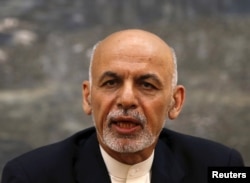Afghanistan’s government and Taliban officials will meet again in Pakistan next week for a second round of peace negotiations aimed at ending the deadly conflict in their strife-torn country, a top Pakistani security official told VOA.
The official, requesting anonymity, was responding to Friday’s assertion that the dialogue would shift to the northwestern Chinese city of Urumqi on Thursday. Unnamed Afghan officials and members of the country’s High Peace Council had made that claim.
The Pakistani official insisted “the talks are being held in Pakistan on July 31," a Friday, adding the foreign ministry in Islamabad is likely to issue a formal statement at some point.
He suggested "Afghan media leaks" about talks being held in China could be an attempt to undermine the "cordial and positive atmosphere" stemming from the groundbreaking July 7 inaugural meeting that Islamabad brokered and hosted.
First direct contact
The interaction was the first direct contact between the Afghan government and the Taliban in 14 years. Chinese and American officials were also present as "observers" at the opening talks in the Pakistani tourist resort town of Murree.
An Afghan presidential spokesman, Syed Zafar Hashimi, told VOA Saturday that negotiations are still continuing to decide the venue for the next week's talks and the composition of the delegations.
A high-powered Afghan delegation – led by the country’s deputy foreign minister, Hekmat Khalil Karzai – held several hours of “preliminary” discussions with their Taliban interlocutors and both sides had agreed to meet again soon.
Afghan officials with knowledge of the peace process say a possible "cease-fire" will be high on the agenda in next week’s meeting and discussions will mostly focus on "mutual trust-building" steps.
The Taliban has not officially commented on the announcement regarding next week's discussions. Key leaders of the Islamist insurgency are alleged to be sheltering in Pakistan and to have links to the neighboring country's spy agency.
Ghani criticized
Some Afghan lawmakers and traditional critics, as well as local media, have criticized President Ashraf Ghani for agreeing to hold the long-desired peace and reconciliation process in Pakistan, citing Islamabad’s support for the Taliban’s violent campaign in Afghanistan.
Soon after the first round of discussions with the Taliban, Ghani had urged the insurgent group to bring its demands in writing to the table for the next round.
Seeking transformation
Pakistan’s state minister for foreign affairs, speaking at the Heritage Foundation in Washington Thursday, said the Murree meeting between Taliban and Afghan envoys was "a small step" and his country had a "wish to transform it into a process."
Tariq Fatemi denied Afghan assertions that Islamabad fully controls Taliban affairs, saying Pakistani leaders "hope that we will continue to use our influence [with the Taliban], limited as it is, in furthering deeper engagement between the Taliban and the Kabul government."
The nascent Afghan peace process is believed to be the result of an improved relationship between Pakistan and Afghanistan.
Peace talks encouraged
The United States has praised Ghani’s initiative for engaging the Taliban in the peace process.
In his annual Eid felicitation message last week, fugitive Taliban chief Mullah Omar also endorsed the peace talks as religiously "legitimate."
The reclusive Taliban leader said he is not opposed to peaceful negotiations if they can help end "U.S.-led foreign occupation" of Afghanistan and establish an Islamic system in the country.





